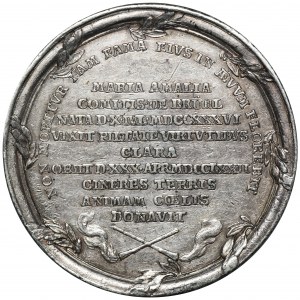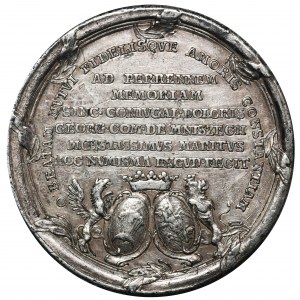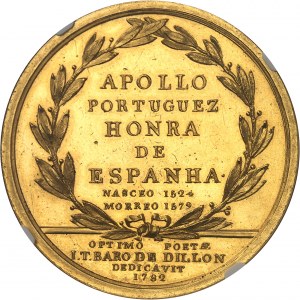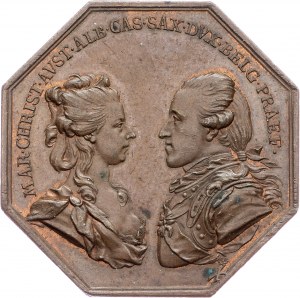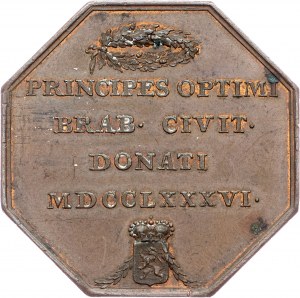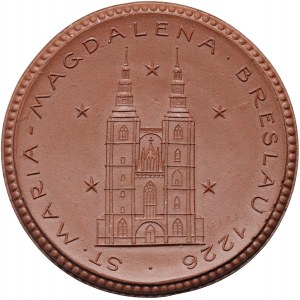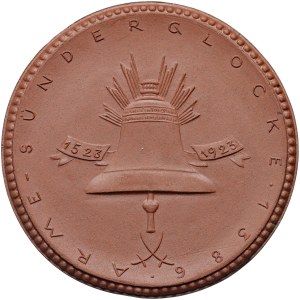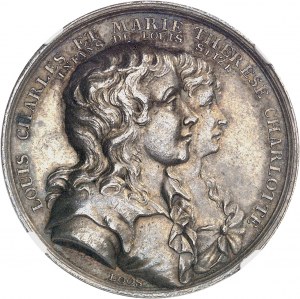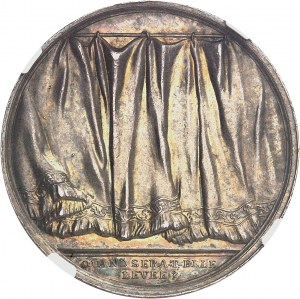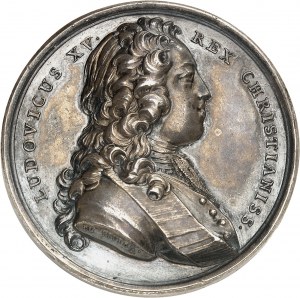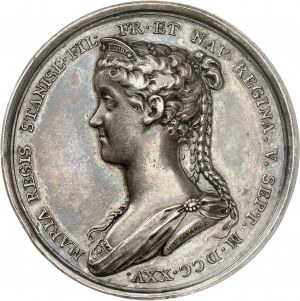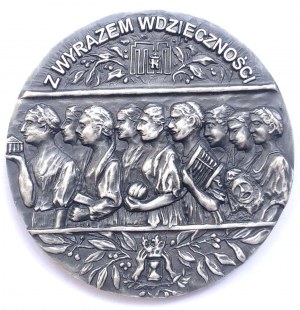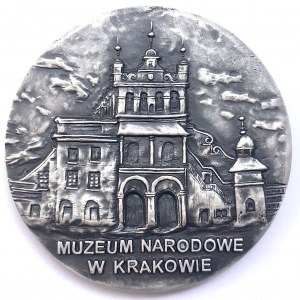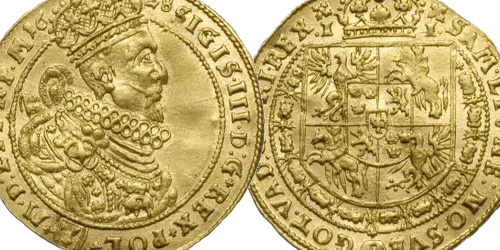A rare medal made to commemorate one of the most important women of the Stanislaus times, who had a serious influence on the political life of the Republic, minted to commemorate the death of Maria Amalia Mniszech, née Brühl.
A nicely preserved piece in a fine patina.
Obverse: inscription in nine lines, around NON MORITUR NAM FAMA EIVS IN AEVVM FLOREBIT (She shall not die, for her fame shall forever flourish), below two torches crosswise downward turned
MARIA AMALIA COMITIS DE BRÜHL NATA D X IVL MDCCXXXVI VIXIT PIETATE VIRTVTIBVS CLARA OBIIT D XXX APR MDCCLXXII CINERES TERRIS ANIMAM COELIS DONAVIT (Marya Amalia Countess Brühl born on July 10, 1736 lived a life of great piety and virtue. She died on April 30, 1772. ashes of the earth, she gave her soul to heaven)
Reverse: inscription in six lines, around O BEATAM MVTVI FIDELISQVE AMORIS CONSTANTIAM (O blessed constancy of mutual and constant love), below two shields under one crown the coats of arms of the Mniszech and Brühl families, supported by a griffin and a lion
AD PERRENNEM MEMORIAM SINC CONIVGAL DOLORIS GEORG COM DE MNISZECH MOESTISSIMVS MABITVS HOC NVMISMA EXCVD FECIT (in eternal remembrance of the sincere grief of Jerzy brabia Mniszech the saddest spouse had this medal minted).
Silver, diameter 42 mm, weight 26.13 g
Edward Raczynski writes on this item as follows: "This is not a funerary medal of a woman for whom nothing more could be said except her wealth and illustrious family; Mary a Mniszchowa is a truly historical person, so with all the more diligence we should have dealt with this medal. Fortunate that, in addition to news drawn from works, I had graciously granted myself by Count Charles Mniszch, son of the Grand Marshal of the Crown, important details for her biography.
Marya Amalia Frederica, the only daughter of Henry Count Brühl, first minister of August III, jener general of artillery in our country, and Maryanna Countess Kollowrat, was born in Dresden on July 10, 1736. She received a careful upbringing and benefited from it so much that she was able to form a thorough way of thinking and acquired the necessary skills in her condition, and was able to speak several languages fluently and decoratively, and write correctly. Beautiful (a), pleasant, rich, shining with virtues of soul, in the very prime of life (b), she became the wife of Jerzy Mniszch, court marshal of the crown, general of Greater Poland, and finally castellan of Cracow, Sanok and Białocerkiew starosta. Her wedding took place in Warsaw, with the greatest pomp. The union was blessed by Komorowski the Primate.
Such an illustrious person must have had a part in national deeds. That is to say, it was with aversion to Stanislaw Augustus, or sooner still a fiery desire for the welfare of the adopted homeland, that she leaned towards the Bar Confederacy and became its soul. Such was her popularity and esteem, such was her power over minds, that everything yielded to her opinion; for her will was pure, her devotion great, her reason thorough, her gift of conviction special, her accuracy in the ways of apprehension extraordinary. She maintained unity and agreement among the chiefs. She knew how to soothe the grieved, how to induce those who were at odds to forget their resentments; she was able to point out what to accept and what to reject in deliberations. So in difficult circumstances, her light, her guidance was sought by her countrymen; her influence was sometimes begged by Dumouriez and Viomesnil, who were attached to the confederates from the French court; in their reports and memoirs they spared no praise for her (d).
In domestic life she was an attached spouse, a good mother, a friend, a mistress; pious, kind, charitable. And in the sciences she had a predilection. Her manuscripts remained in the family, of serious content: about the magnificence of the mind, genius, etc. She ceased to live in Dukla on April 30, 1772. I won't mention other funeral speeches, but I won't omit that Durini the apostolic nuncio, so kind to the Poles, also drew his pen to her adoration (e). A magnificent marble tomb in the parish church in Dukla covers her corpse, unadulterated in the inscription places praise, finished with these words, rightfully belonging to her:
Vivet apud patrios exterosque in aevum.
In the memory of countrymen and strangers she will live forever."



